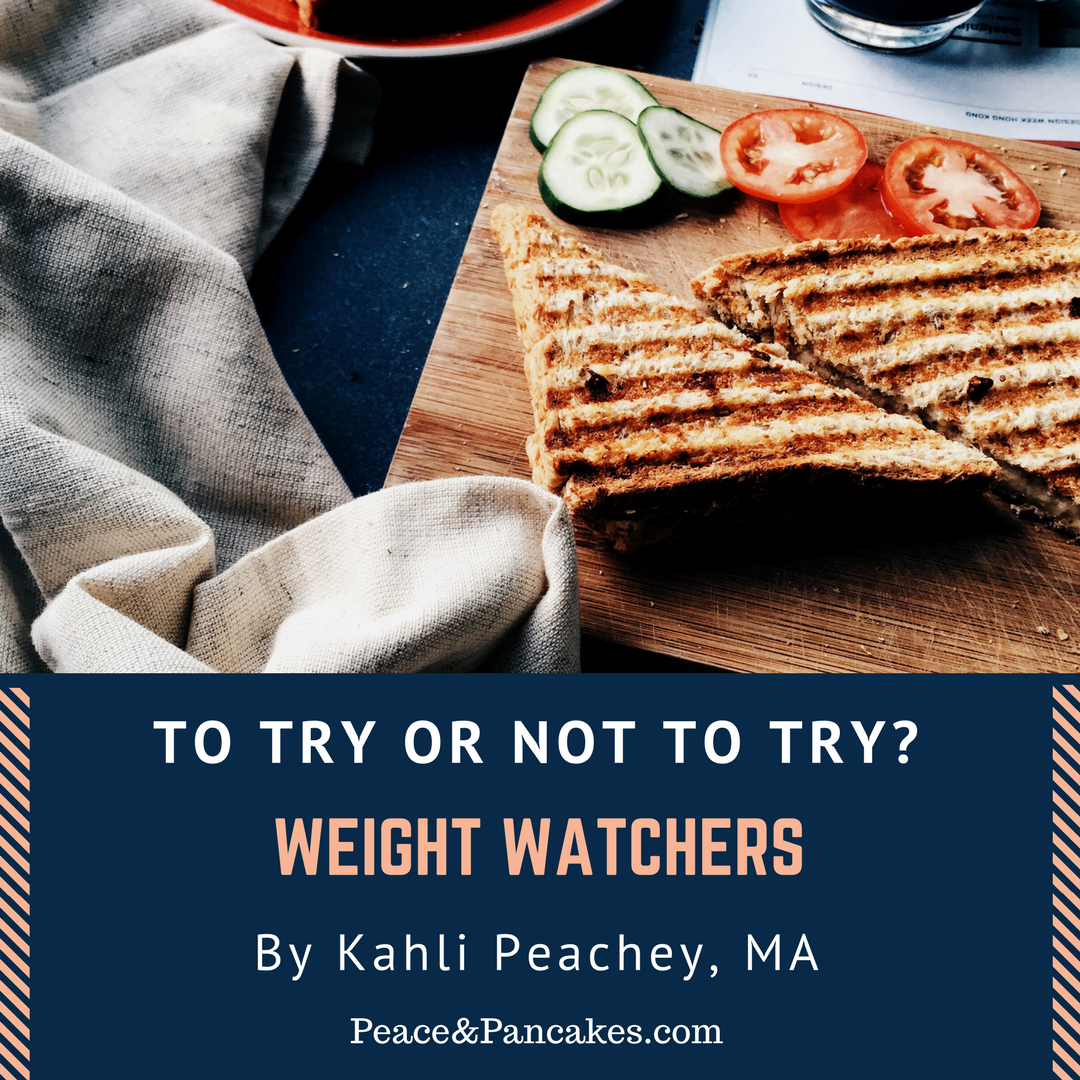This post is part of the “To Try or Not to Try” blog series. Written by a registered dietitian (RD) or dietetic intern, each post explores the claims and science surrounding a different dietary pattern or trend. After compiling this research, each RD or RD2be gave the diet a grade based on whether it appears to hold up to the hype. A = “yes, go for it!” and F = “no way, absolutely not!”
About the Author:
Kahli Peachey, MA just finished completing her dietetic internship and master’s degree. She received her BS in Nutritional Sciences at Penn State University. Connect with her on Instagram at @kalepeach_rd2be.
What is Weight Watchers recommended for?
The primary focus of this program is creating a calorie deficit so the individual loses weight at a healthy rate. The mainstream recommendation for participating in Weight Watchers is for individuals who wish to lose weight (specifically adipose tissue). Although I have not heard of Weight Watchers being recommended for treatment in the medical community, it might be helpful for an individual with a high BMI that puts them at risk for comorbidities such as heart disease, high blood pressure, diabetes, etc.
What foods are allowed?
Weight Watchers prides themselves on not restricting foods (yay!). Weight Watchers utilizes a SmartPoints system, which encourages individuals to eat more fruit, vegetables, lean protein, and less sugar and saturated fats. While I think the point system is great, there are food items that have zero points, such as all fruits and vegetables. An individual could end up eating 800 calories (200 g of carbohydrates) in apples; the individual might as well have had five regular sodas. That is a hasty comparison, but it is important to fully understand the limitations of the diet you are following.
What is the overall nutrient profile?
The macronutrient distribution claims to be similar to the Dietary Guidelines: 45 – 65% calories from carbohydrates, 10 – 35% calories from protein, and 20 -35% calories from fat. The diet appears to be balanced; therefore, I would not expect nutrient deficiencies to be an issue.
Are the claims about Weight Watchers supported by science?
Research has shown the Weight Watchers Online program produces significantly more weight loss at three months with a weight loss loss of greater than or equal to 5% compared to individuals who merely received an online newsletter (Thomas, Raynor, Bond, Luke, Cardosco, 2017). However, what I could not find was research on the long-term management of weight loss after using a Weight Watchers program.
Are there any possible hormonal disturbances?
Although this program might not directly impact your regulatory hormones, it is important to understand the hormones at play. Leptin is secreted by fat cells and decreases appetite. Ghrelin is released in the stomach and increases appetite. Typically, ghrelin levels decrease in obese children (suppressing their hunger). With that being said, if an individual loses weight, there is a possibility their hunger cues (ghrelin) could increase. This is great to assure you are staying in tune with your body and practicing mindfulness, as not consuming enough calories and nutrients is an unfortunate way to stall your weight loss.
Who should definitely not try Weight Watchers?
Individuals who should not try a Weight Watchers program would be those who clearly are at a healthy weight and do not need to lose weight in order to prevent specific disease states. I think it is also appropriate to mention this program is not for individuals from a lower socioeconomic background. Weight Watchers programs can cost approximately $5 – $10 per week, and that is not including the specific food items they recommend purchasing.
Is Weight Watchers realistic and sustainable?
If the individual can afford Weight Watchers, then I believe it is realistic; however, with that being said, it is not realistic for everyone. I would hope the program would assist in instilling healthy lifestyle changes regarding eating a balanced diet and mindful eating, but that is not going to be the case for everyone. I could not find research on the long-term management of weight loss with Weight Watchers, so I would need that evidence before saying whether or not it is sustainable.
What are the overall pros and cons of Weight Watchers?
The pros of this diet are the variety offered, the simplicity of the PointSystem, and the fact that it does not restrict specific macronutrients or food in general. I also love that they offer social support, as this is typically key for weight loss to occur. The cons would be the cost and the promotion of products associated with the program.
What grade do you give Weight Watchers?
Overall, I would grade this diet as a ‘B’ because of the above criteria. While it is non-restricting, follows the Dietary Guidelines, and provides social support, there are limitations including the cost, no quality research on its long-term effectiveness, and the possibility for it to be executed poorly.
What is your recommendation for an eating pattern for the average human?
My general recommendation for a healthy eating pattern would be to look at each of your meals and think: what is my protein source, whole grain, healthy fat, and fruit or vegetable? I think counting calories has its place, but when done with the wrong goals in mind, it can cause orthorexic tendencies. Orthorexia is a condition where an individual becomes obsessed with following a healthy diet and/or lifestyle.
Listening to your cravings is okay, and you are not less of a person because you ate a piece of cake. I encourage readers to work on “mindful eating” and listening to your body’s hunger cues. I truly believe all foods are to be enjoyed and one should focus on fueling their bodies without restriction.
DISCLAIMER:
This content is intended for informational and educational purposes only. It is not intended as medical advice, medical nutrition therapy, or individualized nutrition counseling. Talk to your doctor or another licensed healthcare practitioner before making any changes to your diet, medications, or exercise routine. The opinions of these authors are their own and are not approved, sponsored, or endorsed by any professional organizations including but not limited to the Academy of Nutrition and Dietetics, United States Department of Agriculture, Food and Drug Administration, National Institutes of Health, American Heart Association, and American Diabetes Association.
Sources:
Thomas, JG., Raynor, HA., Bond, DS., Luke, AK., Cardoso, CC., Foster, GD., Wing, RR. (2017). Weight loss in Weight Watchers online with and without an activity tracking devise compared to control: A randomized trial. Obesity. 6: 1014 – 1021.

